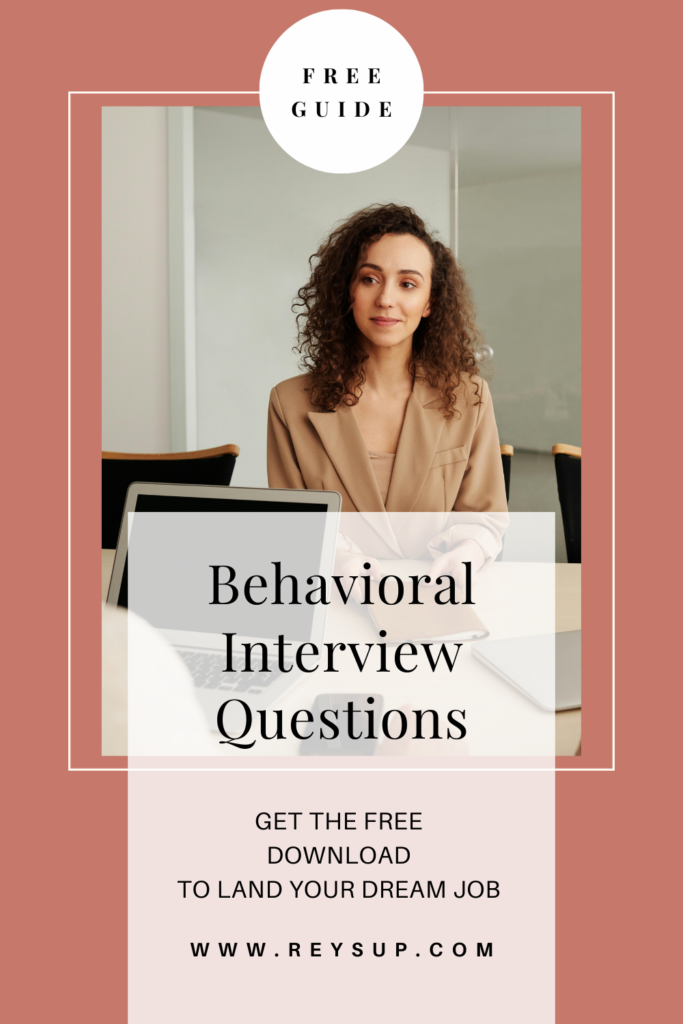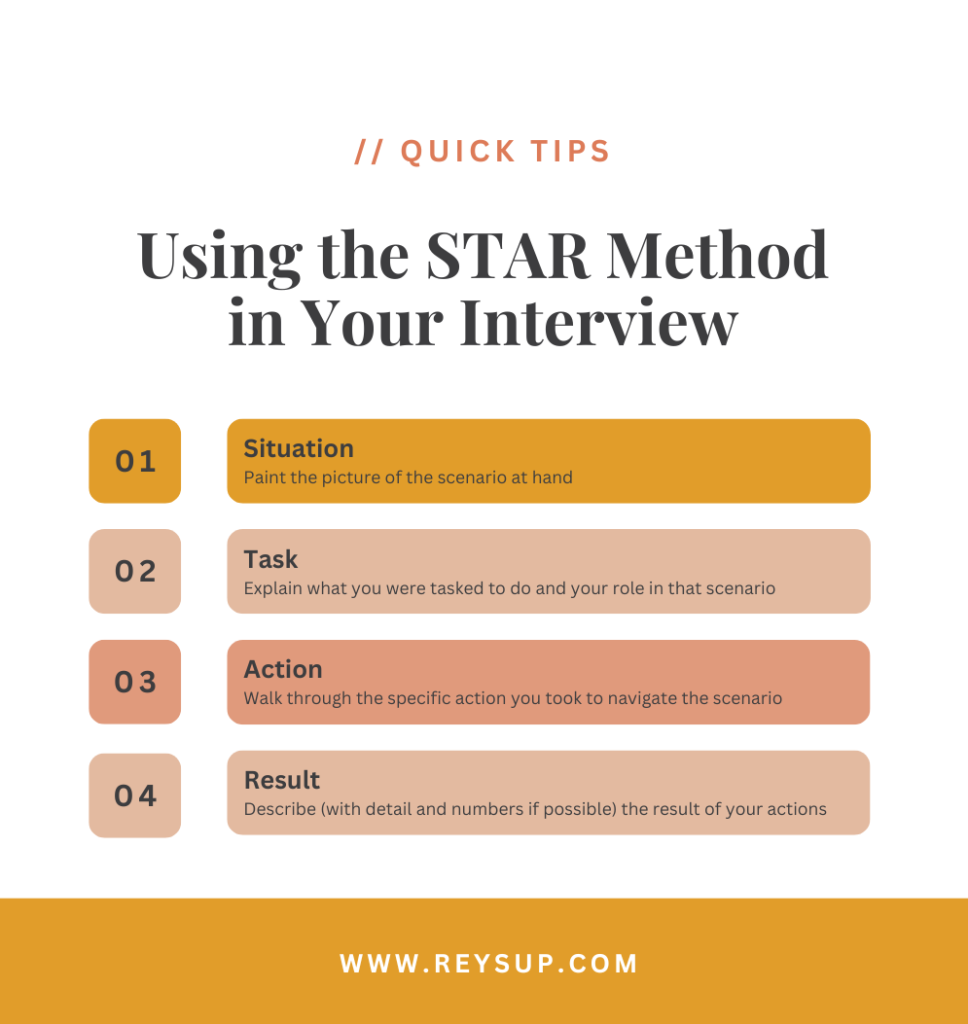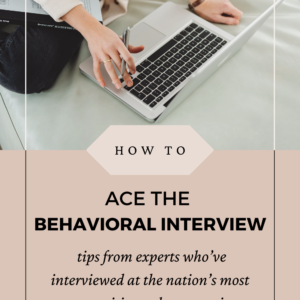Real-life questions that interviewers could ask in your next behavioral interview.

Note: Make sure to scroll to the end to download our FREE Behavioral Interview Guide.
In this previous post, I talk about the behavioral interview and share my fool-proof process to prepare for one. In this post, I will dive in deeper and provide specific questions that you may be asked.
The questions I share within this article have been drawn from my – along with countless of my friends’ and peers’ – interview experience over the last decade at companies such as Google, Twilio, Square, Amazon, LinkedIn, and Netflix to name a few. These questions were asked by real interviewers at real tech companies, and I hope they will serve as a guide to you as you embark on your interview prep journey.
Behavioral Interview Bucket 1: Things you should know going INTO the interview
As a hiring manager, I expect all candidates who walk through the door (or join the Zoom) to have at least done some preliminary research on my company, team, and role. I’m not saying they have to be experts on every single product line and competitor, but they need to know at a high level what we do, why we are different, and the main responsibilities of the role they are applying to.
Sample Questions
- What does the company do? What is its mission and core objective?
- Where does the company operate? Locally, internationally, strategic markets?
- How is the company different from it’s competitors?
- When was the company founded?
- Who are the key players of the leadership team? Founder / President, CEO, COO,CMO
- What are the company’s core products and services?
- Who are the company’s marquee clients?
- Knowledge of a project they just completed / product they just released
- Knowledge of an article where they were feature recently
- Ready suggestion on how to improve one of their current products / processes
- Core requirements and ‘nice to haves’ of the role
- Specific areas of your background that you know are going to raise a flag and a plan to proactively address it in your answers throughout the interview
Behavioral Interview Bucket 2: Questions you could be asked DURING the interview
Before I get into the questions, I want to define two important concepts that will help you articulate yourself in the interview.
The Rule of Threes
- Wikipedia states “The rule of three is a writing principle that suggests that a trio of entities such as events or characters is more humorous, satisfying, or effective than other numbers.” Put simply: people like groups of threes. It feels good to their brain, and when you speak in threes, you are more likely to come across as organized and articulate.
- For this reason, I recommend to all my mentees and clients that when you reply to a prompt in an interview, try to either 1) organize your answer into three distinct segments or 2) have three real life examples ready to share that proves you have been in the situation and know how to handle it. Always start your answer with:
- “Yes, I agree. For three reasons…”
- “Let me answer that question in three parts…”
- “Yes, three examples come to mind…”
Also Read How to get people to do what you want at work
The S.T.A.R Method

- STAR stands for:
- Situation: Paint the picture of the scenario at hand
- Task: Explain what you were tasked to do and your role in that scenario
- Action: Walk through the specific action you took to navigate the scenario
- Result: Describe (with detail and numbers if possible) the result of your actions
- When answering a behavioral interview question, try to index on these four components. Now, don’t go all robotic on your interviewer and recite each answer with this methodology. Read the room and leverage this framework for the meatiest of meaty questions. You’ll probably leave the interviewer speechless with no further questions.
Sample Questions
- Questions specific to the role / company you are applying to:
- Why [COMPANY], why [SPECIFIC ROLE]?
- You are tasked with [INSERT THE MAIN PROBLEM THIS ROLE WOULD BE SOLVING]. How would you figure out where to start? How would you build a bottom up plan to address the goal?
- What trends are important for our industry?
- What are the three things a [INSERT END CUSTOMER OF COMPANY] is most concerned about in general?
- What is (are) important attribute (s) to have in this role?
- What does the culture of [INSERT COMPANY] mean to you?
- General behavioral questions
- What 1-2 things on your resume are you most proud of?
- What motivates you?
- Tell me about a time you told a story with data? What was the context? What data did you use? What was the outcome of that conversation?
- Tell me about a strategic project you have worked on?
- Tell me about a time you persuaded someone to change their mind?
- What are 2-3 principles that you live by?
- Tell me about a time you failed at a project. How did you try to avoid failure? What did that experience teach you?
- Give me an example of a time you’ve worked with a cross-functional team with competing priorities?
- Tell me about a time you wanted something so badly you were unstoppable in pursuing it?
- Tell me about a difficult person or team you were required to work with at a current or previous employer. Describe the situation and how you handled it?
- Tell me about a time where you successfully influenced cross-functional partners towards a common goal.
- How would your cross functional team members describe your strengths and weaknesses?
- Tell me about a project you worked on that involved coordinating input from different teams, how did you stay organized, how did you motivate them to complete tasks by a deadline?
- What does integrity mean to you?
- Tell me about a time you overcame a personal challenge / received negative feedback and addressed it?
- Tell me a time when you were flexible or got thrown a curveball at work?
- Tell me about a time when you effectively managed your team to achieve a goal. What did your approach look like?
- Tell me when you took one for the team
- Tell me about a time you had to have an uncomfortable conversation with a coworker
- Tell me about a time you had to adhere to a decision you did not agree with
- Tell me something you learned recently
On top of the questions above, you should also have a 1-2 minute elevator pitch prepared that explains your career journey to date and what you’ve learned along the way.
Behavioral Interview Bucket 3: Questions you should ask AFTER the interview
As a hiring manager, it always irks me when a candidate doesn’t have any questions. Although it may not be true, it feels like the candidate is not eager to learn more about the role or is as excited about the role as I’d like them to be. For this reason, I always recommend that candidates come prepared with thoughtful questions to ask at the end of the interview.
Sample Questions
- How has the go to market strategy shifted in the past year?
- How many people on the team hit quota last quarter / month?
- Where do you foresee the company / this team / this role in 6 months? What about in 5 years?
- What is the number 1 quality you are looking for in someone to fill this role?
- What does “success” in this role look like to you?
- What is the hardest part of your job?
- What does the growth trajectory typically look like?
- How does [INSERT COMPANY] think about competition? How do you foresee the competitive landscape to shift in the next few years?
And bonus… some questions to ask the recruiter (because let’s be real, our time is valuable and money and benefits are equally important)
- How fast are you looking to fill this role? What is the timeline?
- How many open roles are open on the team?
- What does compensation look like and how is it structured? Is there an opportunity to get equity?
- What do benefits look like (ie 401K)?
- What is the work in office / work from home policy?
Closing thoughts
And that’s it! Hopefully this article makes your prep process a little less ambiguous. Behavioral interviews are uncomfortable. After all, they are literally designed to test us on how we will operate in tough situations. That said, I believe if you come prepared with your STAR and rule of three method answers locked and ready to go, you will breeze through your interview. Who knows, you may even have a little bit of fun!
If you liked the article, be sure to download the free guide.




